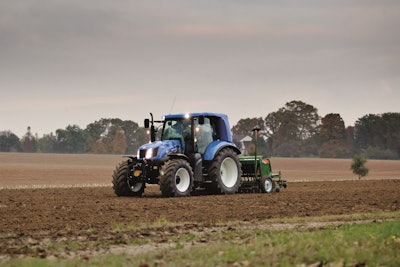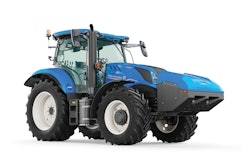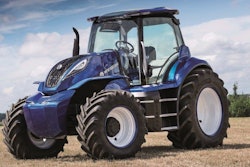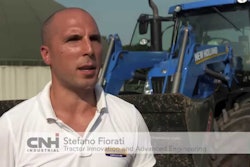
Farmers attending Cereals 2016 June 15-16 got their first look at New Holland’s second generation T6.180 Methane Power tractor and took the opportunity to look inside and quiz the company’s product specialist.
New Holland has a long history of researching and promoting the role of agricultural mechanization within a sustainable future for agriculture, through precision farming, equipment supporting conservation agriculture, training in sustainable farming practices, and alternative energy sources.
This year New Holland brought its message of sustainability to Cereals event visitors by demonstrating the progress of development of its methane powered tractor prototype.
“We’re delighted to bring our Methane Power tractor to the UK and give British and Irish farmers the opportunuity to see it for the first time,” says James Ashworth, Marketing Manager for New Holland Agriculture UK and ROI. “This second generation prototype marks an important stage in achieving New Holland’s goal of energy independent farming. Biomethane, as a renewable source of energy, is an exciting prospect for powering tomorrow’s agricultural machinery.”
The second generation prototype is based on a New Holland T6.180 standard tractor and features a 175 hp (129 kW) Nef 6 engine developed by FPT Industrial that delivers 740 Nm torque.
The nine gas cylinders have a total capacity of 300 L (52kg) compressed methane, sufficient for approximately half a day of normal tractor operations.
The Methane Power tractor can bring fuel cost savings of up to 20%. On environmental performance, the new machine has 80% less polluting emissions than a standard diesel tractor and is already capable of fulfilling future greenhouse gas targets, which are expected to require a 20% reduction in emissions across Europe by 2020.
CO2 emissions can be further reduced by using biomethane, (methane derived from biomass). The switch from methane to biomethane can be made without changes to the tractor or the fuel distribution network, which opens up great opportunities for achieving overall greenhouse gas reduction targets. When powered by biomethane, the tractor’s carbon impact is virtually zero.
Farms with their own anaerobic digestion plants and the ability to grow their own biomass can benefit from a further reduction in greenhouse gas emissions and fuel costs could be cut by as much as 40%.

















